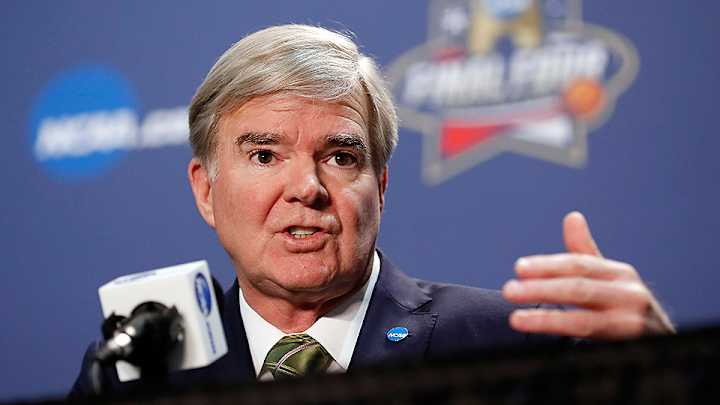Mark Emmert talks potential impact of N.C. anti-LGBT law on NCAA

HOUSTON — There were not many clear answers in NCAA president Mark Emmert’s annual Final Four weekend press conference on Thursday. College athletes, he said, should not be able to unionize to negotiate compensation, but should band together to push for social change or advocate for campus issues. It’s fine that Syracuse is two games away from a national title because its current players were not involved in the infractions for which it was punished last spring, but postseason bans, even years after the corresponding violations, are still worthwhile deterrents. The investigation into alleged academic fraud at North Carolina, also still playing this weekend, will be wrapped up ... well, sometime “in the very near future.”
Power Rankings: Most interesting things to watch at the Final Four
But within all the obfuscation came the reiteration of a familiar and politically relevant stance. Emmert was asked about the NCAA’s hosting of events in the state of North Carolina in light of the passage of HB2, the state’s controversial new law that repealed local LGBT anti-discrimination laws and mandated statewide that all citizens must use public restrooms in accordance with their sex at birth. The legislation has drawn condemnation from the governors of New York, Vermont, and Washington—all of whom banned non-essential state travel to North Carolina—and concern from the NBA, which will put on its All-Star Game in Charlotte next February. On Thursday, Emmert joined the chorus.
“First of all, it's really important to note that for higher education,” Emmert said, “for the universities and colleges that are members of the NCAA, diversity and inclusion is one of the benchmark values that every one of those institutions adheres to. So this is an issue of great importance to us.”
He continued, suggesting that the placement of future NCAA events will take into account the existence of such laws. “The experience our student-athletes, the teams, the universities, the fan base have in any one community is a consideration in where we determine to play these games,” Emmert said. “So in that context, as I’ve made clear in many places ... it will most certainly be one of the variables as the committee makes these decisions. It simply has to be. It's simply far too important to all of our member schools.”
• HAMILTON: Lattin grapples with death of grandmother before Final Four
This was of a piece with Emmert’s stance this time last year, when Indiana—which was home not only to the 2015 Final Four but also NCAA headquarters, both in Indianapolis—passed its Religious Freedom Restoration Act, which would have enabled discrimination against LGBT citizens based on religious beliefs. “We hold lots and lots of events here, our national convention here, our office is here,” Emmert told ESPN then. “We have to say, what are we going to do if this law goes into effect in July, and what’s our relationship with the state of Indiana going to be?” (Indiana subsequently passed additional legislation with LGBT protections.)
Texas Western's 1966 title can be appreciated without game tape
On Thursday, Emmert stopped short of committing to pressure states before such laws come to passage. “We’re trying very hard to be situation-specific,” he said, citing the nuances of each state’s laws.
But University of South Carolina president Harris Pastides, seated to Emmert’s left and chairman of the Division I board of directors, suggested that could change.
“I think the membership is inching toward a more proactive stand on this issue,” Pastides said. “To try to be more proactive is commensurate and compatible with NCAA core values, but values of all member institutions.”
First and second round men’s NCAA tournament games are scheduled to be played in Greensboro, N.C., next season and Charlotte in 2018. The men’s and women’s tournaments will each play regionals the next two years in Missouri, which is considering an amendment to its constitution similar to Indiana’s RFRA bill. It remains to be seen whether Emmert and his cohorts are pressed to turn word into action.

Dan Greene is a writer and reporter for Sports Illustrated. He has been with the magazine since his internship in 2010. He lives in Brooklyn and primarily writes about college basketball.